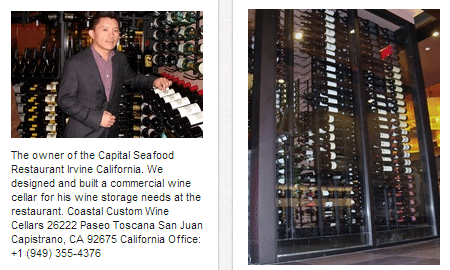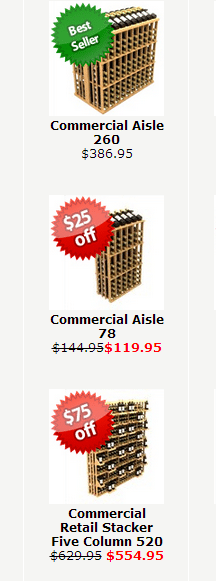Wine Storage – Wine Retail Stores and Commercial Wine Cellars
Putting up a wine retail store is a great way for wine enthusiasts to combine their passion with business. It creates an opportunity for wine lovers to impart their knowledge of wines to other people, while earning a profit at the same time.
Factors Involved in Setting Up Your Wine Retail Business
Before setting up a wine retail business, make sure to secure a liquor license. Then find a location that has a fair amount of foot traffic, and a commercial space big enough to house an entire wine inventory. Determine whether to sell local or imported wine varieties prior to acquiring wine stock.
The wine retail business is a billion dollar industry that is continuously growing as people’s yen for pairing quality fine wines with good food also increases. The wine retail industry is rife with competitors, because more and more business minded individuals venture into selling wines because of its profitability.
Establishing a wine business requires a deeper knowledge of wines, that goes beyond the basics. Hence, taking a wine course or working part time at a wine store will provide the necessary tools required for setting up a successful wine retail business. Reading about wines will help you understand more about food and wine pairing, which can come in handy when customers ask for suggestions.
Fostering connections with key players in the industry, such as wineries and winemakers, is equally important, as these people will eventually become the primary source of hard to find vintages. Being able to provide customers with wine labels that are rare can earn a retail store owner a loyal following.
Wine Storage Facility for Wine Retail Stores
Every wine store needs a place where it can store and protect its entire wine collection from the harmful effects of light, temperature, and humidity. Commercial wine cellars , as the name implies, are specifically designed for commercial use. These professional grade cellars are commonly used by wine retailers, restaurateurs, and bar owners.
Wine storage rooms for commercial use have larger storage capacities compared to residential wine cellars. This means they have large spaces that can hold over a thousand wine bottles for display and storage. Most commercial wine cellars are active, which means they are equipped with commercial wine cellar cooling systems to help regulate temperature and humidity at constant levels.
Proper insulation and vapor barriers should be installed on the walls of the wine cellar to help maintain temperature between 50 and 59 degrees Fahrenheit, and keep humidity at 65% – 75%. Insulation minimizes temperature swings while vapor barriers prevent any moisture build up that can promote mold growth.
Commercial wine cellars contribute to the aesthetic appeal of any commercial establishment such as a wine store or a restaurant. These wine storage rooms are often encased by glass walls to allow retail owners or restaurateurs to showcase their most sought after wine labels to loyal patrons and potential customers.
Wine cellars for commercial use are usually designed in a way that complements the overall appearance of a wine retail store or restaurant because they function as storage and display area for the owner’s wine collection.
Design ideas for commercial wine cellars range from traditional to contemporary. But whatever the decorating scheme, it never fails to enhance the appearance of the commercial establishment and at the same time provides added elegance to the displayed wine bottles.
Coastal Custom Wine Cellars Los Angeles California offers a line of quality commercial wine racks (metal and wood) and has completed several commercial wine cellar projects.
Click here to view them:







